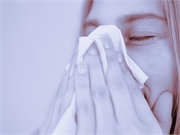- Could Your Grocery Store Meat Be Causing Recurring UTIs?
- Are You Making This Expensive Thermostat Error This Winter?
- Recognizing the Signs of Hypothyroidism
- 10 Strategies to Overcome Insomnia
- Could Artificial Sweeteners Be Aging the Brain Faster?
- Techniques for Soothing Your Nervous System
- Does the Water in Your House Smell Funny? Here’s Why
- Can a Daily Dose of Apple Cider Vinegar Actually Aid Weight Loss?
- 6 Health Beverages That Can Actually Spike Your Blood Sugar
- Treatment Options for Social Anxiety Disorder
What to Know If You’re Headed to College With Asthma or Allergies

If you’re off to college in the fall and have allergies or asthma, it’s not too soon to figure out how you’ll manage them.
“There are many arrangements to be made as you head off to college for the first time, and your allergies and asthma should not be put on the back burner,” said Dr. J. Allen Meadows, president of the American College of Allergy, Asthma and Immunology (ACAAI).
“It’s important to start managing your health issues well before you leave for school, because there are many details to nail down to ensure you stay well as you study,” he said in an ACAAI news release.
Here’s his advice:
- Meet with your allergist before school starts. If you’re going to a school far away, request a referral to an allergist close to campus. Find out if your prescriptions need to be updated or changed.
- Ask your parents how your health insurance works and who your providers might be. Your college may have a plan if you’re not already covered. Find out where to get urgent care when you’re at school.
- If your parents have been the primary managers of your allergies or asthma, you need to take over that role. For example, find out where to pick up prescriptions and order refills, and let people around you know about your allergy/asthma triggers.
- Discuss your allergies or asthma with roommates, friends, your resident advisor and anyone else living nearby. Let them know what you must avoid and how to help if you have an allergic reaction or asthma flare.
- Keep your living area clean to help avoid allergens such as dust and mold. Use products like anti-allergen bedding and air filters to keep allergens away from your nose and eyes.
- If you have food allergies, notify the school, which should have special accommodations for students with food allergies. Talk to food handlers about safety standards and ask about ingredients at every meal.
More information
The U.S. National Library of Medicine has more on college student health.
Source: HealthDay
Copyright © 2026 HealthDay. All rights reserved.










